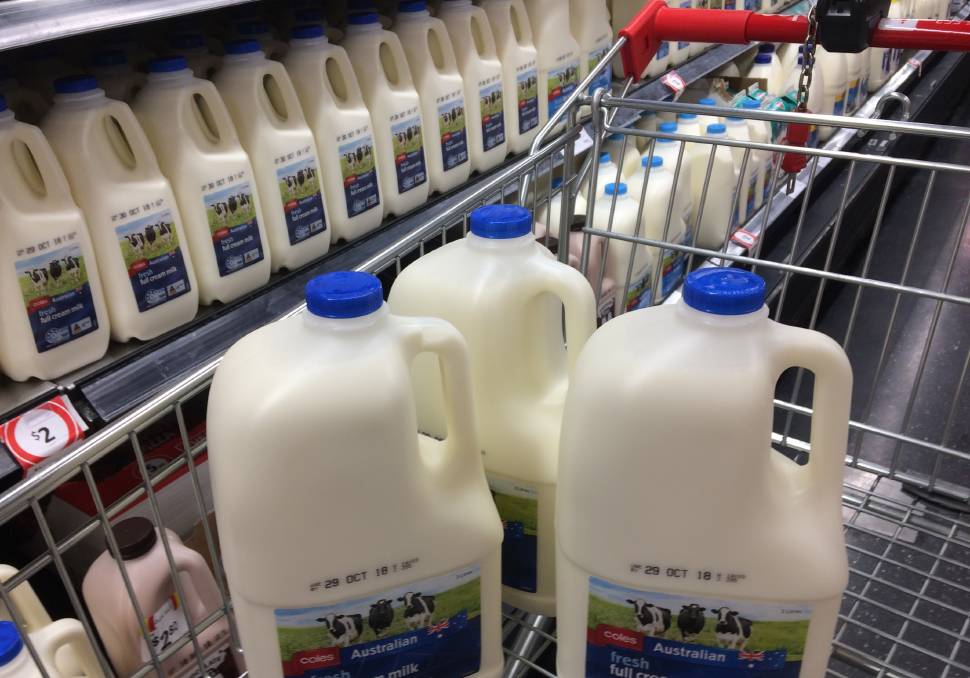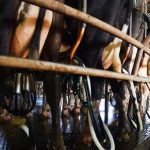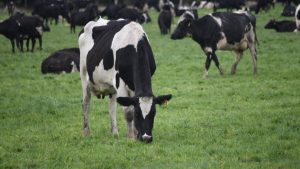
The supermarket group’s relief fund was established to assist milk producers, regardless of their location or the processor buying their milk.
It collected funds on the sale of three-litre bottles of Coles Own Brand milk between September 21 and December 31.
Retail rival, Woolworths, has pledged to continue selling its limited edition drought relief milk range in eastern Australia to keep raising funds until mid year.
Woolworths charges an extra 10 cents on each litre of “drought milk” to be distributed to drought-affected dairy farmers.
By mid-December it had raised $3.1 million in relief payments for more than 280 dairy farmers in NSW, Queensland and Victoria.
Despite summer normally considered a prime time for pasture growth and milk production, Norco co-operative chairman, Greg McNamara, said most farms supplying the NSW-Queensland processor were relying on full feeding rations to keep their herds producing.
Conditions were so unseasonably dry some farms were also trucking in water.
The rain we’d hoped for is yet to arrive, and hot weather has really hurt feed crops and pastures – fodder options could be quite awkward by autumn
Greg McNamara, Norco Co-operative
Farmers on Queensland’s Darling Downs were among the worst hit, but Norco suppliers from the Sunshine Coast to the Manning Valley in NSW were struggling with no pasture growth, and little prospect of useful rain forecast for the next month.
“I’m actually very concerned a severe event like this drought will erode dairy farmer numbers far more than we’ve already seen, leading to Australia becoming very much a dairy importer by 2023,” Mr McNamara said.
Norco processes and bottles milk for Coles’ house brand lines sold in Queensland and northern NSW.
Coles customers contributed a total of $3,974,292.30 to its Dairy Drought Relief Fund after paying an extra 30 cents on the price of each bottle of three-litre milk.
Every dollar collected was earmarked for donation directly to farmers, including almost $1.6m to more than 250 dairy farmers in NSW.
All 639 eligible applicants from across Australia will receive an equal share of the total amount raised.
Chief operating officer, Greg Davis, thanked customers for their overwhelming support of dairy farmers.
“Coles is proud to support the Australian dairy industry and delighted to see customers get behind this initiative,” he said.
“This money will provide critical financial support to dairy farmers to assist with feed and water costs for their cattle, farm improvements and even meeting household expenses.”
A PricewaterhouseCoopers audit accounted for money raised as part of the relief initiative, with administration costs, including the PWC audit, paid by Coles.
The dairy fund distribution brings the total amount of money contributed by Coles and its customers for drought-affected farmers to more than $16m.
This includes an earlier contribution of $7.1m to the Country Women’s Association Drought Relief Fund, made up of $3.55 million in customer donations at the checkout that were matched dollar-for-dollar by the retailer.
The CWA has already distributed grants to more than 1900 drought-affected farmers across Australia and is continuing to provide support.
Coles also pledged $5m in grants or interest-free loans from the Coles Nurture Fund for farmers who have a project to help them to combat drought in the future.
Norco’s Mr McNamara estimated about 190 Norco milk suppliers in NSW and Queensland would receive payments from Coles.
“Due to the extremely difficult conditions on farm and recognising our members were burdened with additional farm work due to the drought, Norco allocated resources to assist farmers to complete their applications to the fund,” he said.
“We actively assisted the application process for around 80 per cent of those members who will receive payments.
“We really thank all the customers who supported Coles’ initiative, which in turn has provided much needed assistance to our farmer co-op members.
“Our strategic partnership with Coles and the support provided has been very important to our dairy farmer members who continue to be adversely affected by this prolonged and debilitating drought.”
He said seasonal conditions were now worse for most farmers than when publicity about the drought and drought help donations went into overdrive in early spring.
He hoped the looming election and the associated intense political chatter did not overwhelm public recognition of the drought’s ongoing seriousness.
“The rain we’d hoped for is yet to arrive, and hot weather has really hurt feed crops and pastures – fodder options could be quite awkward by autumn if we don’t get relief soon,” he said.
“National milk production is now down to 8 billion litres – from almost 12b before the Millennium Drought.
“Unless farmers are making the money they need to feed cows and cover all their other costs, the incentive won’t really be there to rebuild.”

























